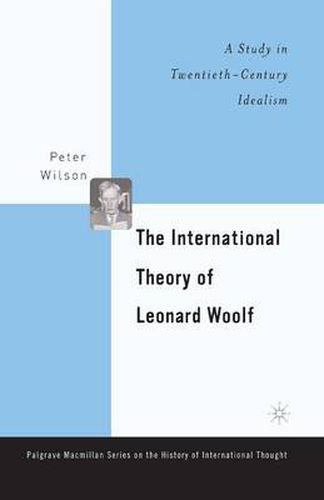Readings Newsletter
Become a Readings Member to make your shopping experience even easier.
Sign in or sign up for free!
You’re not far away from qualifying for FREE standard shipping within Australia
You’ve qualified for FREE standard shipping within Australia
The cart is loading…






This title is printed to order. This book may have been self-published. If so, we cannot guarantee the quality of the content. In the main most books will have gone through the editing process however some may not. We therefore suggest that you be aware of this before ordering this book. If in doubt check either the author or publisher’s details as we are unable to accept any returns unless they are faulty. Please contact us if you have any questions.
Colonial civil servant, Fabian socialist, and eminence grise of the Bloombury Circle, Leonard Woolf was one of the most prolific writers on international relations of the early to mid-Twentieth Century. His report for the Fabian Society, International Government , was influential on the creation of the League of Nations. He was co-founder of the popular pressure group, the League of Nations Society. He was a leading critic of empire. He helped to educate the British Labour Party on global issues, constructing, in 1929, its first credible foreign policy. With his wife, Virginia, he founded the celebrated Hogarth Press. He pioneered ‘functionalist’ and ‘transnationalist’ theory. He pioneered documentary journalism. He wrote towards the end of his long life one of the most insightful autobiographies of the Twentieth Century. This book examines the thought of this fascinating and relatively unknown political thinker. It thoroughly reassesses his ideas, for decades condemned as ‘utopian’, in the context of the much more fluid international scene of theTwenty-First century. In particular, it asks have his ideas about international government gained new pertinence in the post-Cold War world?
$9.00 standard shipping within Australia
FREE standard shipping within Australia for orders over $100.00
Express & International shipping calculated at checkout
Stock availability can be subject to change without notice. We recommend calling the shop or contacting our online team to check availability of low stock items. Please see our Shopping Online page for more details.
This title is printed to order. This book may have been self-published. If so, we cannot guarantee the quality of the content. In the main most books will have gone through the editing process however some may not. We therefore suggest that you be aware of this before ordering this book. If in doubt check either the author or publisher’s details as we are unable to accept any returns unless they are faulty. Please contact us if you have any questions.
Colonial civil servant, Fabian socialist, and eminence grise of the Bloombury Circle, Leonard Woolf was one of the most prolific writers on international relations of the early to mid-Twentieth Century. His report for the Fabian Society, International Government , was influential on the creation of the League of Nations. He was co-founder of the popular pressure group, the League of Nations Society. He was a leading critic of empire. He helped to educate the British Labour Party on global issues, constructing, in 1929, its first credible foreign policy. With his wife, Virginia, he founded the celebrated Hogarth Press. He pioneered ‘functionalist’ and ‘transnationalist’ theory. He pioneered documentary journalism. He wrote towards the end of his long life one of the most insightful autobiographies of the Twentieth Century. This book examines the thought of this fascinating and relatively unknown political thinker. It thoroughly reassesses his ideas, for decades condemned as ‘utopian’, in the context of the much more fluid international scene of theTwenty-First century. In particular, it asks have his ideas about international government gained new pertinence in the post-Cold War world?